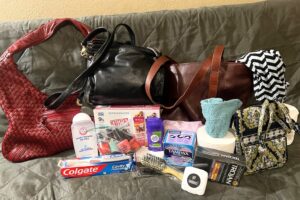The first things you notice about Chaka Aza Amahle are her tall stature, her large, vibrant glasses and her eclectic, self-designed jewelry. Talk to her for a bit, and you’ll discover she has a passion for taking care of women, and a desire to be outside. For the past eight years, those two things have powered her personal efforts to care for the immediate needs of those she calls “her girls,” or “siSTARS,” – the women on the streets of St. Louis offering sex services.

Chaka grew up in the Normandy School District. Before the start of her senior year of high school, Chaka became pregnant with her first child and had plans to go to cosmetology school upon graduation. Her mother didn’t think Chaka could support a family in a beauty career and insisted she go to either Washington University in St. Louis, where her mother was long-employed, or to Saint Louis University. She chose the latter, where she attended for one year before moving out and enrolling in cosmetology school.
Pocketbooks
By 2015, Chaka was making good money while styling hair. One day, while pumping gas, a young woman living on the streets asked her for a sanitary pad. This made Chaka wonder how many girls don’t have access to period products, and she realized she had been taking her access for granted.
A couple of days later, Chaka came across a girl with her personal items in a plastic bag. Chaka thought of how her grandmother would have been appalled that the girl did not have a proper purse. Chaka remembered how her grandmother referred to her own purse as a pocketbook. “As kids, we laughed,” Chaka says. “Her pocketbook? It’s a purse!” With her grandmother in mind, Chaka started collecting purses—referring to them as pocketbooks—while putting pads and tampons in them, along with other essential items: a bar of soap, a towel, a comb and brush. She and her friends began handing out the pocketbooks to any woman living on the streets.
Chaka continues to collect purses and fills them with essentials. She gets free period supply kits from several branches in the St. Louis Public Library system. The kits contain a variety of overnight pads, tampons, and panty liners, an inspirational note, and information on menstruation. The kits are provided to libraries by the St. Louis Area Diaper Bank and the Alliance for Period Supplies. Chaka uses the umbrella name of Pocket Book LLC for her efforts, but has never formalized as a non-profit organization. When Chaka started asking for the kits, she would ask for two. Now that the libraries know her, she is able to get eight kits at a time.
siSTARS
Chaka soon met a man with a YouTube channel, Street Talk STL, and he and Chaka interviewed many people on the street and offered them help. She says it gave her an opportunity to get personal with the girls she met outside in the Hamilton Heights area, near Goodfellow Blvd. and Wells Ave. in North St. Louis City.
Chaka says she prefers to use the term “prostitute” over “sex worker” for her girls, because she says, “For Black women, that’s what we’ve been called all our life.” She’s met women who have sex for money and then go back to their families. Speaking for the women, Chaka says, “My community? We sleep outside. We addicts. We don’t have no shoes. We don’t have no house to go to.”
She admits it was rough in the beginning to speak to the women. “I didn’t know how to talk to them,” she says. She would ask why they were there; they would respond by asking who was paying her. “They’re damaged. They’ve got so much trauma. They don’t know who to trust,” she adds, having met girls who were thrown out of cars, pistol-whipped, and beaten and robbed by the men who paid them.
Chaka built trust by showing up consistently and providing gifts, including her pocketbooks. “I can’t go out there today and expect everybody to trust me tomorrow,” she says, “I’ve got to keep coming and keep showing my face.”

Chaka has a short intake form she fills out for each new girl she meets. She asks about their needs, birthdays, hobbies, and if they want treatment for addiction. She asks about hobbies to determine what they might want to do if they get clean—cooking and dancing often come up. But, she says, “I don’t want to just build up a bunch of paperwork, keep asking them questions, and they never get any resources.”
If they respond “yes” to wanting treatment, she’ll ask if they want it right now—most put it off, and she doesn’t push the issue. Chaka says many of them want to quit, but get high to avoid the effects of withdrawal, or they see treatment as a drug replacing a drug. Some will go to detoxification centers, but are dropped back off to the neighborhood. She says, “What they want is to be taken out of that environment.”
She estimates she sees about 20 women per day on the street, with files for over 100 women, and each one is dealing with substance abuse. She has yet to see someone leave the lifestyle.
Chaka has heard from many women why they are on the streets- left unhoused by a caretaker’s passing; raped by an uncle; or introduced to crack. She says one woman became addicted after her boyfriend told her to take heroin for cramps. Three sisters, ages 13 to 21, were brought by their mother to make money working the streets to support her addiction.
WHATchuNEED?
Over the years, Chaka has built a support system through Pocket Book LLC for a variety of items. She bought a phone and started a “What Chu Need?” hotline. The number is posted on her Facebook page and is there for those who need food, clothing, or just somebody to listen to them; it is also for those who want to give. Chaka will reach out to find whatever is needed, but she makes no guarantees. Recently, a woman called for cleaning supplies and a trash can.

Chaka left hairstyling in 2020 during the COVID-19 pandemic. Last June, Chaka began working for Better Family Life, a community development organization focused on neighborhood stabilization, as a community engagement specialist. She says she loves the job and is now getting paid for something she was already doing.
Chaka says her girls do get food from community organizations, but she says, “They get tired of lunch meat.” On Sundays, Chaka makes a large dinner to share with the girls. She also brings them donations from Chik-Fil-A of unsold breakfast food, including biscuits, eggs, sausage, and chicken patties.
Williams & Associates, Inc., a community based public health agency addressing minority health disparities and health equity, provides Chaka with bags of condoms. She says James Green, Director of Operations and co-founder, is her biggest supporter
Chaka says the girls “still want to be cute.” She has provided makeup, fake eyelashes, lip gloss, and perfume. The women also want combs, brushes, ponytail holders, and hand mirrors. She says, for African American women, “Our hair is our glory.”
Chaka learned, however, the girls can be very picky about clothing and will tell you when they think the clothes are ugly. She says the girls don’t like jeans, preferring leggings, skirts, and dresses—many are underweight and need small and medium sizes. Pastor Richard Jackson, founder and CEO of Manasseh Ministry, recently donated a truckload of Steve Madden brand clothes. “I was in Heaven,” Chaka says, “Everything was brand new!”
The most needed items are socks and gloves, especially this time of year. Chaka was ecstatic when one woman gave 300 pairs of socks, pinned together and cleaned.

Chaka takes items to the women usually late at night or in the early morning hours. If men are around the women, she’ll stay inside the car until they leave. She then pops her trunk. While she carries a gun in her purse, the women protect her. “They are very defensive when it comes to me,” she says, “A lot of them depend on me.”
Celebrating her siSTARS
In 2020, Chaka organized a Kwanzaa Resource Celebration to honor the seven principles of Kwanzaa, a celebration rooted in African American and pan-African culture. She met with the girls at a park that first year. Better Family Life, the Organization for Black Struggle, and The T, an organization focused on harm reduction were there, too. In 2021, she moved the event indoors to give the women a day of warmth, pampering, and relaxation.
A few years ago, Chaka asked a girl what she wanted for Christmas, and the girl said no one had asked her before. Now, she makes a wish list in October and sends it out to her resources to adopt a siSTAR. The event is held the third Saturday in December. Attendees are asked to dress in African attire—red, black, and green—and told they will be feasting with sex workers and the unhoused judgment free.
Unintentionally, Chaka says, she started a regular toy drive in 2021 after a University of Missouri – St. Louis employee brought a bunch of toys to Chaka’s Kwanzaa event. Now, she collects toys in November. Next year, she may start earlier to get ahead of the seasonal drive.
Chaka would love to see a safe house for her girls, particularly during the often brutal St. Louis winter, and has considered getting an apartment for herself and allowing the girls to stay at her home to take a shower or cook in the kitchen. She says many of the women don’t go to shelters because of time restrictions.
Chaka says their toolbox for survival is limited. “A lot of them are very smart. I have learned from them. You get your honest, best conversations from people in the street, because there ain’t no sugar coating it.” She says the biggest pain in her heart is that she hasn’t seen anyone get off the street.
Chaka says a lot of people don’t care about what happened to her girls and merely judge them because they’re there, to which she reminds them, “You could be here tomorrow.”